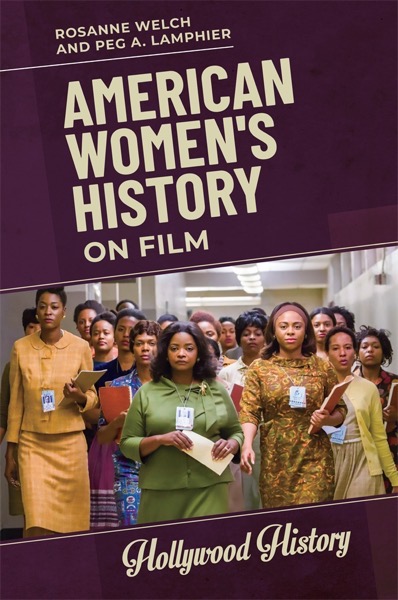I’m proud to announce my latest book (co-written by my colleague Peg Lamphier) is set for publication this November 2022 by ABC-Clio/Bloomsbury. In it we take a look at 10 films that tell stories about famous moments or women from Women’s History in the United States.

Films covered in each chapter are:
- Norma Rae (1979)
- Silkwood (1983)
- Joy Luck Club (1993)
- GI Jane (1997)
- Iron-Jawed Angels (2004)
- Salt of the Earth (1954)
- Monster (2003)
- Hidden Figures (2016)
- Confirmation (2016)
- On the Basis of Sex (2018)
We’re particularly pleased with this cover. We learned from our Encyclopedia of Science and Technology that you have to ask for what you want upfront. For that one, the art department had chosen photos of 2 male inventors and the space shuttle to decorate the cover. We asked that it be 2 male inventors and one female inventor for balance. No one had thought about including a female until we asked. So for our Civil War on Film book, we asked for that upfront and sure enough, though the bulk of Civil War films are full of dudes in uniforms they found a photo of Sally Field as Mary Todd Lincoln sitting beside Mr. Lincoln.
For Women’s History in the United States, we asked to be sure to include women of color and you’ll see we succeeded at that request.
Similarly, a couple of years ago in my work as book reviews editor for the Journal of Screenwriting I asked to use a photo of Ruth Prawer Jhabvala on the cover since one major article was about her amazing career writing everything from Room with a View to Howard’s End to Jefferson in Paris. The editor agreed but then production hit a snag in that the only photo available in our price range was too small to blow up to fill the whole cover. But then someone in production had the great idea to use that small photo several times, strung along on a graphic that made it look like a strip of film with that same picture in every frame. Creative and brilliant and salvaged the idea of having a female face on the cover while simultaneously celebrating the work of a wonderful female writer.
I’m learning!

From ABC-Clio…
By exploring a range of films about American women, this book offers readers an opportunity to engage in both history and film in a new way, embracing representation, diversity, and historical context.
Throughout film history, stories of women achieving in American history appear few and far between compared to the many epic tales of male achievement. This book focuses largely on films written by women and about women who tackled the humanist issues of their day and mostly won.
Films about women are important for all viewers of all genders because they remind us that the American Experience is not just male and white. This book examines 10 films, featuring diverse depictions of women and women’s history, and encourages readers to discern how and where these films deviate from historical accuracy. Covering films from the 1950s all the way to the 2010s, this text is invaluable for students and general readers who wish to interrogate the way women’s history appears on the big screen.
Features
- Focuses on 10 films with an emphasis on racial and class diversity
- Explores where storytelling and historical accuracy diverge and clarifies the historical record around the events of the films
- Organized chronologically, emphasizing the progression of women’s history as portrayed on film
- Accessible for general readers as well as students


![09 Gwen Cooper from Why Torchwood Still Matters with Dr. Rosanne Welch, San Diego Who Con 2021 [Video]](https://rosannewelch.com/wp-content/uploads/2022/06/rmw-whocon-2021-torchwood-09.jpg)
![13 More On The Classic Books Couldn't Teach Without from In Conversation with Dr. Rosanne Welch [Video]](https://rosannewelch.com/wp-content/uploads/2022/06/rmw-intellect-13.jpg)

![07 Husbands As Unreliable Narrators from When Men Forget Women: The Many Ways Male Screenwriters Fail to Mention their Female Colleagues [Video]](https://rosannewelch.com/wp-content/uploads/2022/05/rmw-scms-2021-07.jpg)
![17 Diverse Writers…from The Difficulties and Delicacies of Writing the First Female Doctor in 50+ years [Video] [Doctor Who]](https://rosannewelch.com/wp-content/uploads/2022/05/rmw-whocon-2021-chibnall-17.jpg)
![08 Ianto Jones from Why Torchwood Still Matters with Dr. Rosanne Welch, San Diego Who Con 2021 [Video]](https://rosannewelch.com/wp-content/uploads/2022/05/rmw-whocon-2021-torchwood-08.jpg)
![12 The Classic I Couldn't Teach Without from In Conversation with Dr. Rosanne Welch [Video]](https://rosannewelch.com/wp-content/uploads/2022/05/rmw-intellect-12.jpg)
![06 Female Writers Can Be Unreliable Narrators from When Men Forget Women: The Many Ways Male Screenwriters Fail to Mention their Female Colleagues [Video]](https://rosannewelch.com/wp-content/uploads/2022/05/rmw-scms-2021-06.jpg)

![16 Guest Characters…from The Difficulties and Delicacies of Writing the First Female Doctor in 50+ years [Video] [Doctor Who]](https://rosannewelch.com/wp-content/uploads/2022/05/rmw-whocon-2021-chibnall-16.jpg)